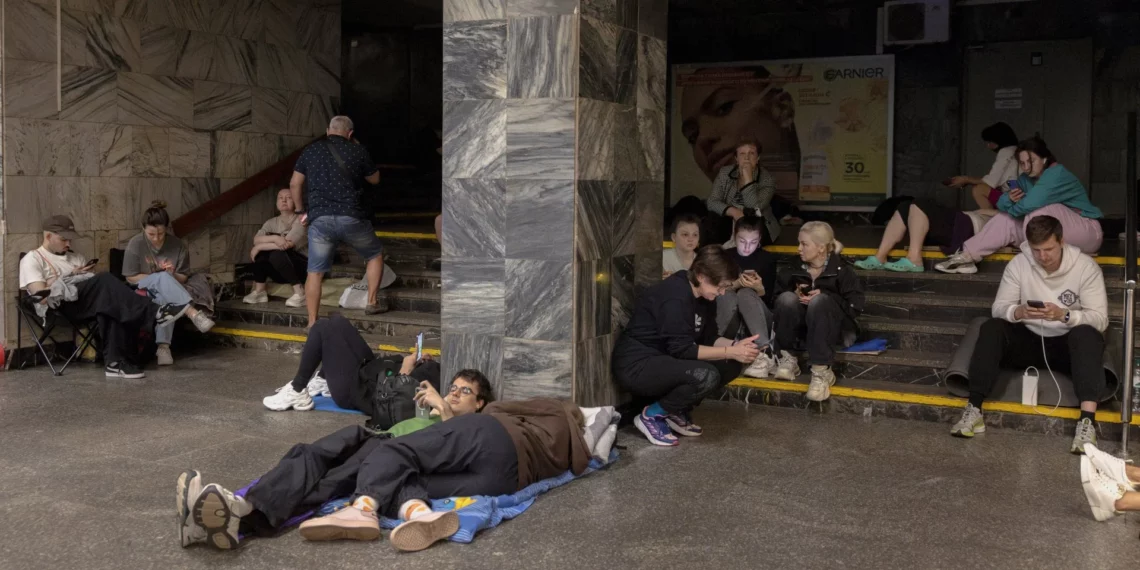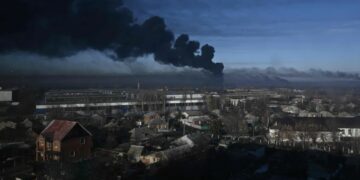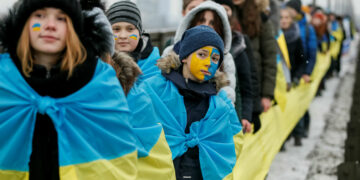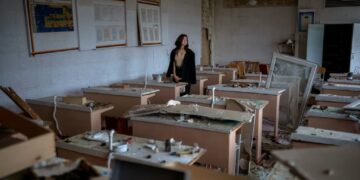The voices within this collection offer a poignant and powerful glimpse into the concerns weighing on the hearts and minds of individuals in Ukraine today. From the deeply personal anxieties of displacement and loss to broader societal worries about the ongoing war and its global repercussions, these reflections paint a vivid picture of resilience amidst immense challenges.
Anna Anykiienko:
The biggest anxiety…
Late at night, I often go to sleep with a terrifying thought that I would never return to my home. Skadovsk is occupied by russia since the start of the full invasion, my whole life was left behind and the vision of the past is chasing me…
I am starting to forget how (one day) well-known streets go by, how the sea smells and how my room looks like. You feel so left and empty, like the part of your life is constantly being erased.
Anxiety about the future-will my job of choice still be valuable?
And how is it even possible to buy my house, when people are surviving on the minimal wage?!
I am afraid to be left alone, sometimes you feel the endless spiral in your chest that drags you deep down to your fears and stress takes you in its hug.
I am 22, but each day I feel the sharp touch of anxiety, it is difficult to breathe.
Will it be better one day?
Julia Baran:
Today, Ukraine faces several deep problems that cause anxiety and tension.
The first and most urgent issue is the war, which has been going on for more than three years. People die every day, cities are being destroyed, and millions of Ukrainians live in fear and uncertainty.
The second serious problem is mobilization. Many men live in constant anxiety due to strict regulations. They are afraid to leave their homes. On the one hand, it is clear that the country needs to be defended, but on the other — not everyone is morally or physically ready for it. There is often a feeling that the state treats citizens not as people, but as a resource.
The economic situation is also deeply troubling: low wages, high taxes, and an unstable labour market — all of this is only exacerbated by the war. The state should support people under such conditions, not put even more pressure on them. People work hard, but barely make ends meet.
There is also the issue of rights and freedoms. There is a growing sense that the laws are becoming harsher and more absurd, while the Constitution is being violated more frequently. This undermines trust in the authorities.
Kristina Kaliafitska:
What I am concerned about is the war against Ukraine. We should be concerned about the war in Ukraine because it is not just a local conflict, but a great tragedy that affects millions of people and has serious consequences for the whole world. The war has destroyed the lives of many Ukrainians — people have lost their homes, jobs, relatives and loved ones. Children cannot study normally, families are forced to leave their hometowns and runaway to other countries. Bombings, fear, lack of electricity, heat, and water — all this has become a daily reality for those living in the war zone. This is enormous pain and suffering that cannot be ignored.
In addition, the war in Ukraine is impacting other countries. It has led to higher food and fuel prices, supply problems, and heightened political conflicts. All this proves that war is not just a Ukrainian issue. It is a challenge for the full world because it threatens values that are important to every democratic country: freedom, human rights, and security. Therefore, it is very significant to remain concerned, learn more about what is happening, talk about it, and support Ukrainians — with words, deeds, or assistance. Indifference in such a situation only exacerbates evil and allows injustice to grow. Every good deed, even a small one, matters
Bogdan Hatsenko:
Mental health is a crucial aspect of overall well-being, yet it is often overlooked or misunderstood. Mental health concerns such as anxiety, depression, and stress affect millions of people worldwide, impacting their ability to function, build relationships, and live fulfilling lives.
One of the most common issues is the stigma surrounding mental illness. Many individuals hesitate to seek help due to fear of being judged or misunderstood. This can lead to worsening symptoms and feelings of isolation. Education and open conversations are essential to break this stigma and encourage a more supportive environment.
Diana Kohut:
Absolutely, I am deeply concerned about my mental health. In today’s fast-paced world, it’s easy to get caught up in the daily grind, the constant stream of information, and the pressures to perform. This can take a significant toll on one’s psychological well-being. I find myself increasingly aware of the need to actively nurture my mental state, just as I would my physical health. This concern isn’t just about avoiding burnout or stress; it’s about fostering resilience, emotional intelligence, and a sense of inner peace in a sometimes chaotic environment. I believe that acknowledging and addressing mental health challenges openly is a crucial step towards creating a more empathetic and supportive society. Taking care of my mental health involves a conscious effort to build healthy habits. This includes prioritizing sufficient sleep, engaging in activities that bring joy and relaxation, and maintaining strong connections with friends and family. I’ve learned the importance of setting boundaries, saying no when necessary, and not comparing myself to others. While the journey to optimal mental well-being is ongoing and can have its ups and downs, my concern for it drives me to continuously learn and adapt. It’s about recognizing that mental health is not a destination, but a continuous process of self-care and self-awareness, essential for living a fulfilling and balanced life.
Anastasia Voitsekhovska:
Do you concern about your future career?
Yes, I do. I often think about what job I will have after university and whether I will enjoy it.
The job market is changing quickly, and it can be hard to know what to expect. I want to find a job that I like and that also gives me stability and opportunities to grow.
Sometimes I worry that it will be difficult to get a good position without experience. That’s why I try to study well, gain skills, and take part in different activities now. I believe that if I work hard and stay motivated, I will build a successful future.
Anna Teslenko:
I was thinking to write about my concerns about war. But then I realised that this is not something I concerned about anymore, so ghat actually something that makes me concerned. I’ve become so used to a state of constant anxiety that it’s very difficult to shock me with something bad because I always think of something even worse. I’m anxious that I’ve started to react to bad news with the phrase “well okay” And it’s not that I’m sleeping through everything, no, I wake up because of the explosions and also think “oh well, whatever happens, happens.” And all of this really concerns me because I no longer worry about my life.
Although all of this may be a coping mechanism, just to be able to go on living, rather than some hypothetical shelling of a children’s hospital knocking me out of commission and leaving me unable to function for a couple of days.
Maryna Andrushko:
Every person has their concerns. Personally, I am concerned about the spread of Ukrainian culture and language. Because of the influence of Russia and the Soviet Union, our identity began to be erased. Endless bans and decrees influenced this, for example: the Ems Decree, the Values Circular. So many foreign friends have a misconception about Ukraine and Ukrainians.
Unfortunately, because of the tragedy of war on our land, people began to learn more information about our country. This applies only to foreigners, but also to Ukrainians themselves.
Unfortunately, we had russified regions where russian was dominant. Language is not just a method of communication, but also an indicator of belonging to a certain nationality. I am very happy to see and hear more and more Ukrainian: news, magazines, books, public speeches, cartoons. I am also pleased with the trend that young children are also being retrained to speak Ukrainian. However, despite these positive moments, stereotypes remain. But I believe that in the future, Ukrainian will only develop and spread.
Bogdana Fedyuk:
The war in Ukraine deeply concerns me. It has affected everyone, both adults and children. People all over Ukraine are suffering from the war, and everyday life for Ukrainians has changed. Air alerts have become routine and something familiar, and it feels like we are all living “on standby,” waiting for something bad to happen at any moment. I am concerned that my youth is passing like this, with fear and constant news about destruction and death. There is no sense of stability, security, or confidence in the future, and sometimes, we don’t even know if tomorrow will come for us.
I worry about what kind of children will grow up in these times. What will they learn? What psychological traumas will they have to cope with? I read somewhere that these children are already being called the “lost generation.” It sounds quite pessimistic, doesn’t it? It’s difficult to form a healthy and strong personality when you grow up in fear, surrounded by cruelty and injustice, with encouragement of violence and killing because, sadly, this is the only way we, as a nation, can survive. Whether these children will grow up with tendencies toward cruelty and violence, we will only know in the future. But one thing I can say for sure, no matter what happens, we will stand strong and survive this war. Some people will be “broken” by the war, unfortunately that’s inevitable, but there will also be those whom the war will make stronger. These people will carry the future of our country and its recovery. I just hope that there will be more of the strong than of the “broken.”
Sofiia Ivanova:
In my opinion, the future is one of the most important and motivating parts of life. But if we’re talking about whether I worry about my personal development about becoming a Person, an individual — then yes, I do worry.
Comparing my childhood to now, I realize that today I have to at least survive somehow earn money, study well to get a proper education and work in a good, well-paid company. I must also take care of my health, stay socially active, and maintain contact with people. This is a lot of work, and in order not to lose the balance between burnout and motivation, one must first and foremost work on oneself. I do worry about the future because nowadays, in my view, things are harder we live in a country at war. We face different kinds of crises, both economic and emotional.
There is constant stress, and I can feel it, in the sense of always being in a tense state. This affects health negatively. But I still feel optimistic about the future. I understand that it’s hard right now, but we also understand why we’re doing all of this. We are striving for something greater in life, and I believe staying optimistic is powerful and meaningful.
Olha Zadorozhna:
One of the things I am most concerned about is my mental health. Since the war started, I have felt more stressed, and it has become harder to stay calm and relaxed. Even when nothing bad is happening, my mind often feels tired or overwhelmed. I try to focus on self-care and stay connected with people who support me, but sometimes it still feels like too much. The constant pressure of uncertainty and fear has made it difficult to feel safe or peaceful.
Another thing that worries me is my anxiety. Before, I didn’t feel it so strongly, but now it shows up more often in my daily life. It makes me overthink and doubt myself, even when there is no real reason. I am trying to work through it step by step — by learning more about it, talking about my feelings, and giving myself more kindness. I know this is a journey, and I’m doing my best to heal and feel better again.








